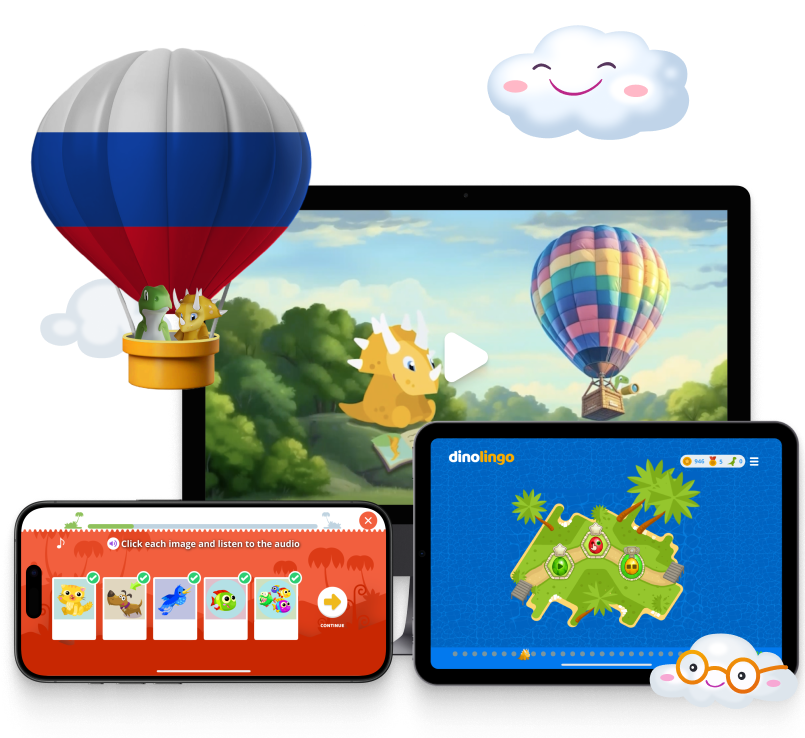Russian Names: More Than Just First and Last
Have you ever wondered how Russian names work? In many countries, people use a first name and a last name, and sometimes a middle name. In Russia, most people use three parts, and each part tells a story about family and tradition. Dinolingo is a language-learning platform for ages 2-14 with 50 languages, and learning how names work is a fun, cultural way to start exploring Russian.
Russian names: how the three-part system works
Russian names usually have three parts: a given name, a patronymic, and a family name. This structure helps people show respect, family connections, and even a bit of formality in daily life. The patronymic is the most unique part for many learners because it is formed from the father’s first name. For boys, a patronymic often ends in -ovich or -evich, and for girls, it often ends in -ovna or -evna. If a father is named Viktor, his son might be Viktorovich, and his daughter might be Viktorovna. It is a simple system, but it carries a lot of meaning because it connects children to their family history.
This naming pattern shows up in school, in formal settings, and in respectful conversation. Adults may use the patronymic to address teachers, elders, or professionals. Kids usually use first names with friends, but they quickly notice the respectful forms around them. This is a great way to teach kids that language is tied to culture. If you want a broader cultural picture, see Russian culture for kids and connect naming traditions to stories, holidays, and family life.
russian name: first, patronymic, family
A single Russian name tells you more than one thing. The first name shows identity, the patronymic shows family connection, and the surname shows the broader family line. This can make introductions more respectful, especially in formal contexts. Kids can practice this by making a simple name card: one line for the first name, one line for the patronymic, and one for the surname. This small activity helps them see the structure and remember the pattern.
russian language hello: greetings that use names
Greetings can be formal or casual depending on the setting. In a formal setting, people may use a first name and patronymic together as a respectful greeting. In a casual setting, friends may use a short version of the first name or a nickname. This is a good way to show kids that greetings change based on who you are talking to. Pair this with simple phrases from polite Russian words so kids understand how respect and kindness show up in language.
Russian names in daily life and culture
Russian names often have short forms and affectionate forms. For example, Aleksandr can become Sasha, and Anastasia can become Nastya. These shorter versions are not just nicknames; they can show closeness, affection, and personality. That is why kids hear multiple versions of the same name in stories and songs. Learning these variations helps children understand relationships and tone in Russian. It also helps them recognize names when they appear in books or cartoons.
Names also connect to history and celebration. Many families choose names that honor grandparents or reflect cultural traditions. Some names have meanings that relate to hope, faith, or love, and those meanings can become part of family stories. You can pair a name lesson with cultural activities like Name Day celebrations or holiday vocabulary. This is a natural bridge to broader topics like history, holidays, and local traditions.
russian alphabet handwriting: spelling names with confidence
Learning to write names in Cyrillic is a fun way to practice the Russian alphabet. Start with a short list of common names and focus on letter shapes that appear often. Writing a name is a quick, meaningful task, so kids stay engaged. You can connect this to alphabet practice with Russian letters kids love and make a simple chart that shows the name in Latin letters and Cyrillic side by side.
easy russian words: add name-related vocabulary
Build a short vocabulary list that connects to names and family. Words like mother, father, sister, and friend help kids talk about the people behind the names. This creates a small, practical vocabulary set they can use right away. You can reinforce these words with games and songs from learn Russian for kids so language practice stays consistent and fun.
Use names to help kids learn Russian
Names are a perfect starting point because they are personal. Kids love to talk about their own names, their friends, and family members. You can build short routines around names: a greeting, a quick writing practice, and a short conversation. Keep it light and repeat it often. This helps kids feel comfortable with the language and creates a positive routine around learning.
To keep the routine interesting, rotate themes: one week focus on first names, another week focus on patronymics, then practice surnames. You can connect this to family stories or simple cultural facts. For example, you can explore how names show up in Russian holidays or folk tales. To support the cultural side, see Russian celebration words and link the vocabulary to a real event.
how to learn russian: turn names into a routine
Set a five-minute routine: say a name, spell it, and use it in a sentence. That is all you need to build momentum. As kids grow more confident, add a greeting or a short phrase. Short routines beat long sessions every time, especially for ages 2-14. This approach works well with Dinolingo’s interactive lessons because the practice stays playful and easy to repeat.
FAQ
1. Why do Russian names have three parts?
The three-part system shows a person’s first name, family connection through the patronymic, and their family surname.
2. What is a patronymic?
A patronymic is a middle name formed from the father’s first name, often ending in -ovich or -ovna.
3. Do kids use patronymics at school?
Students might hear patronymics in formal settings, but friends usually use first names or short forms.
4. Are Russian nicknames official?
Short and affectionate forms are common in daily life, but official documents use full names.
5. Can one Russian name have many versions?
Yes. A name can have a formal form, a short form, and several affectionate variations.
6. How can kids practice Russian names?
Use name cards, spelling practice in Cyrillic, and simple greetings that include names.
7. Are Russian names tied to culture?
Yes. Names often reflect family history, cultural traditions, and regional preferences.
8. Do Russian surnames change for girls and boys?
Many Russian surnames change endings to reflect gender, such as -ov and -ova.
9. What ages are best to start learning Russian names?
Children can start as early as age 2 with simple names and greetings, then build over time.
10. How can Dinolingo help with Russian names?
Dinolingo offers kid-friendly lessons, songs, and games that make name practice easy and fun.
Final Thoughts Russian names are more than just labels. They are full of tradition, meaning, and personality. Once kids learn the three-part system and hear affectionate forms, they start to notice names in stories, history, and everyday conversation. With a simple routine and the right tools, learning Russian names becomes a fun cultural adventure.
Sources
Start Learning a New Language Today!
Best Language App for Kids.
7-day free trial. Then only $19/month. Cancel anytime.

